Tales From Along the Wallaby Track No. 1187, Monday July 2, 2012
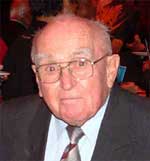 Norman McVicker OAM
Norman McVicker OAM1920 – 2012
Norman McVicker produced 1186 articles on the ‘quirky’ characters and aspects of Australian history. His writing spanned 23 years work of love. Today, in the final chapter of Tales from along the Wallaby Track, we explore a colourful character and aspects of his life.
By S Lee
Norman McVicker retired to Mudgee (NSW) in 1980, but he did not retire from pursuing his interests in writing and performing arts. He was a bookaholic and never stopped learning.
In 1947 he founded St Peters Community Players that evolved into the Pocket Playhouse, a Sydney unique little theatre. The theatre operated without subsidy until 1973, when it closed after eighty nine seasons. During this time the Pocket Children’s Theatre emerged playing matinees on Saturdays and a professional production of Spoon River for the NSW Arts Council touring 28 country towns.
Between 1966 and 1971, Norman was a member of the Australian UNESCO Committee for Drama and Theatre having been appointed by Prime Minister, Harold Holt.
In Mudgee, he was a local historian and volunteer writer of Tales from Along the Wallaby Tracks, a weekly column on the Mudgee Guardian. For over 23 years, he produced 1185 articles focusing on ‘quirky’ characters and aspects of Australian history.
In 1989, Norman led the restoration of Eurunderee School near Mudgee where one of Australia’s literary greats, Henry Lawson grew up and received his education.
For those contributions, in 2003, Norman received Order of Australia Medal for service to performing arts, particularly theatre and to the community of Mudgee, presented to him by Prof. Marie Bashir AC, NSW Governor. After that, Local MP, George Souris presented the 2006 NSW Premier’s Outstanding Community Service award to Norman. This is followed by a NSW government 2007 Seniors Week Achievement Award for outstanding contribution to the community in the field of Education and Lifelong Learning.
Early Years
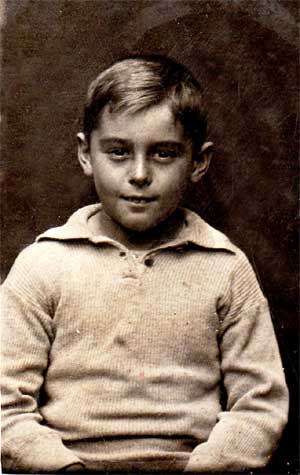 Portrait of Norman at Ss Peter and Paul Convent school.
Portrait of Norman at Ss Peter and Paul Convent school.Norman was born on the 19th January 1920, in Tempe (NSW). Growing up in the great depression era was not particularly pleasant, having one income to support three families. Nevertheless, his families made it up in many different ways. Norman enrolled at Ss Peter and Paul convent in Hillcrest street, Tempe, a few minutes walk from his family home.
His interest in writing emerged during his time at Tempe Public School with Mr Neil McNeil, a composition teacher who later encouraged him to enter Health and Temperance Examination where he won a book prize twice in a row: “A ploughboy Premier” in 1932 and “The road to Widgewong” in 1933.
Norman went to Canterbury Boys High where events took place that later primed him for what was to come. His English teacher, C S Yarwood who encouraged him to write for radio shows in the brink of the early days of the “Golden Age of Radio”. Youth concerts by Sydney Symphony Orchestra at the school conducted by Sir Malcolm Sargent and Sir Bernard Heinze influenced his selection of theme and incidental music in his radio scripts and theatre plays. Furthermore, inspiration for the plays also came from a complete set of Charles Dickens which he lay-by from Grace Brothers Broadway at 1/- each. He eventually paid off the book after working at Bernard Quigley real estate, King street, Newtown during school holidays.
Radio Years
On his 17th birthday, his radio scripts, “King Peter” and “Black Diamond” were accepted and produced by Bill Beatty for 2SM children session “Uncle Tom and His Gang”. After that, he auditioned and read children news with Nerrisa Niblock at 2UW during the coronation of King George VI and Queen Elizabeth (Queen mother). He then produced a series of short 10 minutes plays called “Cameos from Australia” which was a popular 2UW Children session throughout 1937.
On the 28th April 1938, Norman arranged a compilation of Charles Dickens work and was broadcast by 2UW with Joy Nichols played “Nancy” in the Oliver Twist segment. This is followed by another radio serial “Marooned” which run for 26 episodes. After that, he produced 26 episodes of “West of Sydney” sponsored by NSW Jam co. During the two years period, he also radio-interviewed many well known people in those era and was grateful to Tommy Hudson and JM Prentice who mentored him in the radio business.
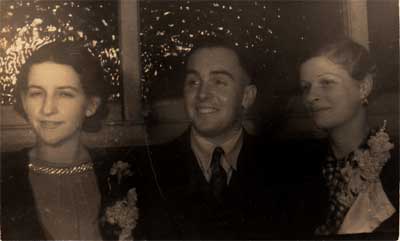 Aunty Ivy, Norman, Wendy Burge at the 2UW Children’s Session c1937
Aunty Ivy, Norman, Wendy Burge at the 2UW Children’s Session c1937In 1939, war clouds were gathering in Europe. After six years in the army, Norman joined Actors’ Equity and started writing a few scripts for Lou Vernon “Dr Mac”, a long running series at 2GB. He often quoted a common line from his colleagues, “Dear God, please don’t let me have to write Dr Mac to survive”. In 1950, Norman’s script “They gave him a gun” was accepted by Actor’s Choice and broadcast by 2UW with all star cast: Alan White, Sheila Sewel, Bebe Scott, John Cazabon, Charles TIngwell and Ossie Wenban. Again in 1951, Norman produced episode 59 “Dark Eclipse” with all start cast: Bruce Stewart, Brenda Sender, Sheila Sewell and Lionel Stevens.
The last of Norman’s radio years, was when he and Ruth Cracknell were interviewed by Gwen Plumb at 2GB in 1968. The three of them had known each other for some time. He later met Ruth again in Mudgee in 1994 for the premier of “Spider and Rose”. He often quoted Sumner Locke-Elliot’s line at one of Actors’ Equity meeting “Well my dears, it would seem another bloody genius has joined our ranks”. It’s time to move on.
The War Years
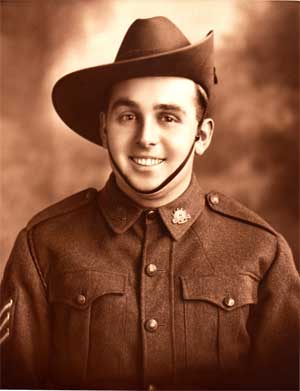 Norman, 1941 (Sergeant).
Norman, 1941 (Sergeant).In 1940, on his 20th birthday, Norman was required to enlist under Part IV Defence Act 1903-1939. He reluctantly followed the footpath of his father, uncles, cousins and brother but never talked about the war years in details (i.e. the period between 1940 and 1946).
Nevertheless, he visited the Australian war memorial in Villers Brettonneux, France and Florence, Italy to find the grave of his family members.
After the VJ Day, Norman demobilised his unit and did a journalism course with Alan Marshall author of “I Can Jump Puddles” and in correspondent with Evelyn Tildesley, Director of British Drama League of Australia who later become a dear friend and mentor for Norman.
While caring for his mother who passed away in July 1947, Norman actively involved in Actors’ Equity meeting. In August 1947, he worked for Commonwealth Bureau of Census and Statistics, then 1949, he joined British Commonwealth Pacific Airlines (BCPA). In those days, BCPA often inevitably referred to as Ben Chifley’s Private Airlines.
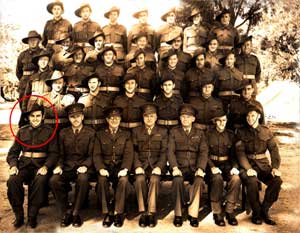 Norman, front left (Staff Sergeant).
Norman, front left (Staff Sergeant).Airline Years
Norman worked for BCPA as an auditor, a completely new experience for him, but he adapted quickly. BCPA was eventually absorbed into QEA (Qantas Empire Airline) which later became Qantas.
During the 31 years period at Qantas, he joined the overseas audit circuit allowing him to travel to many countries around the world. He could recall auditing experience in European countries, north and south America, Africa, Middle east and Asia, at the time of political upheaval such as the cold war, coup de tat in Jakarta and many other events.
Norman eventually became an audit manager in Qantas and he was the longest serving auditor for Qantas at that time.
In 1979, Norman contemplated a retirement, bought a property near Mudgee, which marked the beginning of a new adventure.
 Norman as audit manager in Qantas c1970.
Norman as audit manager in Qantas c1970.Theatre Years
Norman’s exposure to theatre went back to a young age. He met Strella Wilson at his aunt – the Grahams in Wollstonecraft during a “sing around a piano”, then again, 50 years later, Norman met Strella Wilson at Australia House, London, they reminisced the time.
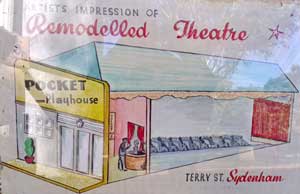 Design of the new Pocket Playhouse theatre
Design of the new Pocket Playhouse theatreDespite the depression, his family managed to treat him to a popular of live performances and films in the 1930s, which later inspired some of his work.
In October 1942 when he was posted to an Army Training School at North Geelong, he was hooked by the magic of ‘live’ theatre at the opening night of Gladys Moncrieff in ‘The Maid of the Mountains’ and he was enslaved for life.
Towards the latter part of 1947, whilst still working at the Bureau of Census and Statistics, Norman gathered a group of young people and formed St Peters Community Players at a local Methodist church hall. They received publicity in Sydney Sun, on March 26, 1949 on the fourth production of ‘The Invisible Circus’ by Sumner Locke-Elliott. It was the first Australian play to be produced by St Peters Community Players.
Between 1947 and 1956, Norman completed 34 productions some of which were performed at the British Drama League Australia (BDLA) festivals, Metropolitan theatre and other venues.
In 1956, the group then moved to the Rechabite Hall in Terry street, Tempe. May Hollinworth donated theatre seats after closing her little theatre in Reibey Place, which later passed on to Illawarra Theatre Guild, Rockdale. This was also the time when St Peters Community players changed its name to Pocket Playhouse.
The Pocket Playhouse was officially opened on 1st February, 1957 by the then Premier of NSW, J.J. Cahill, who was also the local Member of Parliament. The first play, ‘I Remember Mama’, caught the imagination of the theatre going public and success seemed assured. Among the cast were Patti Assange, Valerie Askew, Brian Farmer, George McLaren, Melva Kitchen and Ron Farrow.
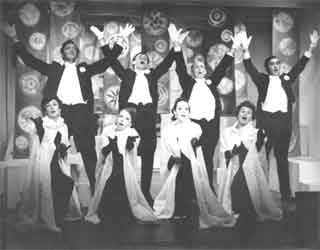 Norman’s production of the Limelighters c1970.
Norman’s production of the Limelighters c1970.In the late 1960, renovation of the Rechabite Hall became inevitable. Evelyn Tildesley came to the rescue securing a loan with Rural Bank. Stan Catts and his team with members of the Pocket Playhouse rebuilt the Hall into a new Pocket Playhouse complete with amenities. The new building was reopened on the 16th February 1961 by the Governor of NSW, Sir Eric Woodward.
Norman’s charm and social networking skills had made the above possible and achieved many things for the Pocket Playhouse. He became firm friend with May Hollinworth, Evelyn and Beatrice Tildesley, Doris Fitton and Constance Robertson. Beatrice later donated $500 for Pocket Awards and commissioned Arthur Murch to design the award. The award was given annually to Pocket playhouse members for excellent achievement. Ian Maxwell and Norman Kessell were in the selection panel.
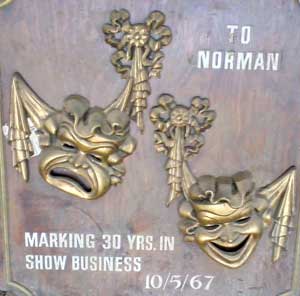 Norman 30 years in show business.
Norman 30 years in show business.Between 1966 and 1971, Norman was a member of the Australian UNESCO Committee for Drama and Theatre having been appointed by Prime Minister, Harold Holt. His appointment was to replace Evelyn Tildesley who decided to retire.
In 1963, Norman, May, Doris and Beatrice were in the BDLA panel judging 3 act play competitions. They selected Marien Dreyer’s play “Bandicoot on a Burnt Bridge” as the winner despite stiff opposition from Leslie Rees (Chairman of the Playwrights’ Advisory Board).
In 1965, Norman met John Barton in Stratford, UK and persuaded John to allow him to produce The Hollow Crown, which he produced on the 12 August 1965 at the Pocket Playhouse.
In November 1973, Pocket Playhouse closed permanently due lack of funding, after 89 seasons (include St Peters Community Players). In those times, there have been many people who made a start of their career in the Pocket Playhouse. Memorable events for Norman were a visit from Vivien Leigh to the Pocket Playhouse for the presentation of “The Sleeping Prince”, and a number of Australian play scripts performed at the pocket, such as “Image in the clay” by David Ireland, and those by other writers such as Marien Dreyer, Sumner Locke-Elliot, Oriel Gray, John Hepworth and Dorothy Blewett. Later, he wrote his own scripts, a collection of Australiana “The Limelighters”, “Banjo”, “Fairy tale theatre” and “Damper and tea”. Miles Franklin visited the theatre several times and had written several one act plays, but Norman was not interested – nevertheless they became good friend.
Many outstanding practitioners emanated at the Pocket Playhouse: Robert Findlay (stage manager in UK), Roger Barratt (lighting expert at the Sydney Opera house), Noeline Brown, Peter Carroll, Robert McDarra, Gerry Duggan, Graham Corry, Ronald Tunstall (Tom Lee, UK), Kevin Peatfield, David Brown, Ron Owen, Tim Bennett, Dorothy Duncombe, Jim Langdon, Colin Kenny, Brendan Dunne, John Gillies, Stephen Firkin, etc. Norman maintained contacts with a number of ex. Pocket Playhouse via email.
Retirement Years
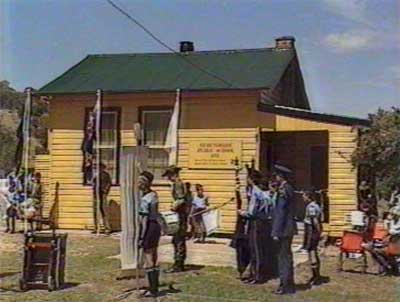 Re-opening of Eurunderee School.
Re-opening of Eurunderee School.Soon after moving to Mudgee, Norman quickly became involved with the Mudgee Arts Council as a foundation member, mentoring musical productions at schools and other local cultural activities.
When he received a call from the department of land about their intention to sell the land where Eurunderee School is located (This is the school and the area where Henry Lawson was educated and grew up), Norman immediately formed the Eurunderee Provisional School Foundation to save, restore and open the historic landmark. The team consisted of Norman, Brendan Dunne, Carl Werchon and Betty McLean. They raised fund and worked tirelessly with volunteers for over 26 weeks to repair the school.
The school opening day was a success. Norman then prepared a submission for the school and grounds to be listed on the National Estate to prevent future sell-off. This was achieved and gazetted on 26 November 1991. On 10th March 1993, NSW governor, Peter Sinclair paid an official visit to the school and to commemorate the occasion, he unveiled a plaque and planted a gum tree on the school ground.
In the retirement years, Norman began writing a weekly column in Mudgee Guardian “Tales from along the Wallaby Track” in 1989. The column captured local and national history of Australian pioneers.
During this time, Norman received the fore mentioned medals and awards for his contributions to the community and performing arts.
At the age of 92, he continued writing the column, reaching 1185 articles over 23 years. He was working to the very end of his life, he was writing article 1186 on the day before he was unable to physically stand up and was hospitalised. Norman enjoyed talking to people and was chirpy the day before his passing in Mudgee hospital, on the 21st May 2012.
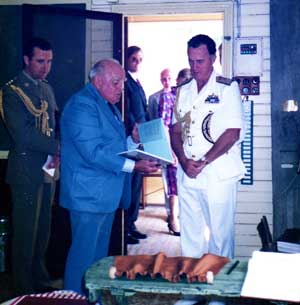 With the Governor, Rear-Admiral Peter Sinclair, on his visit to Eurunderee School.
With the Governor, Rear-Admiral Peter Sinclair, on his visit to Eurunderee School.Norman will be remembered by many for a dedication to his work, aspiration for high quality theatre productions and writing, determination, energy and eccentricity that flexed our daily lives, generosity and for giving many people a start in their careers.


You must be logged in to post a comment.